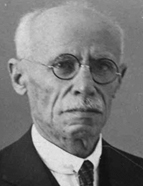

Lúcio de Azevedo died on 5 November 1933. On 10 November, O Século published an obituary paying tribute to the ‘eminent academic and erudite historical researcher’ with a portrait of the historian. The news of his death by Robert Ricard in the Journal de la Société des Américanistes [Journal of the Americanists Society] was even more appreciative, although brief. The journal Nação Portuguesa [Portuguese Nation] also paid him a heartfelt tribute (issue III, 1933). Issue IV of 1934 devoted a nine-page article to him, signed by Manuel Múrias, the first comprehensive assessment of his life and work. I n 1934, at a session of the Instituto Histórico e Geográfico Brasileiro [Brazilian Historical and Geographic Institute] , he was recognised as ‘the Portuguese Capistrano de Abreu’.
Jorge Borges de Macedo emphasised how J. Lúcio d ’ Azevedo renewed and perfected the interpretation of economic history, drawing attention to the importance of economic conditions in the history of societies, seeking to adapt a new vocabulary to his account. Prepared by reading and critically reviewing foreign authors and drawing on the examples of Alberto Sampaio in his essay on towns in the north of Portugal and Costa Lobo on Portuguese society in the 15 th century, Lúcio de Azevedo projected his syntheses of economic history for Portugal in the form or concept of era. We are well aware of how historians when presenting syntheses, make use of tables and sequences, and the concept of era has the particularising role of drawing attention to man in time, to the conjuncture, to what is specific to the expert ’ s treatment in analysing the particular without neglecting the general. This is how it was understood by Fidelino de Figueiredo at the time ( Revista de História [History Magazine] , no. 2 , April-June 1912).
Underlying the concept of era and in order to define two specific situations, the Author also used the concept of cycle when talking about India and the ‘pepper cycle’ and, subsequently and in a way Vitorino Magalhães Godinho considered appropriate, the ‘first gold cycle’, without exhausting his explanatory resources with this concept . In addition, in the form that Lúcio d ’ Azevedo gave it, and perhaps due to his knowledge of German historiography in which the theorisation of the Ideal Type arose, another virtue stands out: the essayistic account, the search for the significant terms among the others, a perspective that was not understood by some critics.
This work is financed by national funds through FCT - Foundation for Science and Technology, I.P, in the scope of the projects UIDB/04311/2020 and UIDP/04311/2020.
